By Anna Hayes
Anticipation for a good holiday is at the heart of Michael Gow’s classic play ‘Away’ which has been revived for a run at Theatre Works’ HQ in Acland Street. I say ‘revived’ but it seems like this is a work that is never too far from the Australian theatrical consciousness.
The play opens with the aftermath of a school drama production, with principal Roy (Stephen Tall) wishing everyone well for 1968.
We meet Meg (Cait Spiker) and Tom (Rupert Bevan), the two young stars of the production who tiptoe around each other with all the nervousness of teenage attraction.
From there, we meet Meg’s parents, Jim (Justin Hosking) and Gwen (Eleanor Howlett), and Tom’s English immigrant parents, Harry (Iopu Auva’a) and Vic (Stefanie Falasca). From the moment Gwen opens her mouth, she comes across as an angry woman, determined not to be at blame for the lost keys, and complaining about both the choice of play and being unable to see it from the back.
By contrast, Tom’s parents are full of praise for their son. We learn that they have been in Australia for eight years – Gwen later scorns the fact that both parents work, and in a factory, elements of classism firmly on display.
Finally, like the ghost of Kim Novak (as she says herself) Coral (Linda Cookson) wordlessly enters and ignores all conversation, much to the dismay of husband Roy.
Roy and Coral have lost their son in Vietnam and neither is dealing with the grief. It is clear there is a disconnect between husband and wife – Roy simultaneously implores Coral to understand that he did not make their son go to war – as the play rolls on, Coral refers to her son’s death as their sacrifice – the price they paid to live in a country with such a high standard of living.
Meanwhile, Meg’s family has landed at its campsite where mother and daughter have a blazing Christmas morning argument. Jim tries, in vain, to give Meg some context, some understanding of her mother’s upbringing – a seeming rags to riches story that explains her determination that their daughter will not face the same challenges that she did.
As a storm hits on New Year’s Eve, we see Meg’s family driven from their campsite and Roy and Coral lock horns over her behaviour.
The second half is a much brisker affair as all characters, except Roy, reunite.
We learn the truth about Tom’s family in a gut-wrenching scene with a stunning piece of acting from Auva’a and Hosking. It’s interesting that in a play about unspoken emotions and traumas that most of the deep introspection comes from its male characters.
I did feel that Gwen’s sudden change of heart was too drastic – yes, she has been informed (offstage) of the family misfortune by Vic but the shift in her persona seemed too substantial for someone who had shown off a number of deeply ingrained prejudices in the early acts.
The Vietnam war is something that looms large in the play, despite the sporadic mention of it. We don’t get anti-war monologues or philosophical discussions over the fishing rods, but it’s there in the background, right from the moment Roy wishes everyone a happy 1968 in the first scene.
Staging is kept simple with a couple of moveable mounds of set and otherwise simple tables and chairs. Lighting is used to brilliant effect in depicting the storm, creating a hellish landscape that, as I saw it, made Coral think of her son in a warzone.
In terms of sound, we are given both soundscape and some musical numbers from the cast – most notable among them, a rousing rendition of Harry Styles’ ‘Sign of the Times’ by Stephen Tall. The song might be fifty years ahead of their time, but the lyrics are so apt that it can be forgiven.

The cast members (including a hard working chorus) are all excellent in their various roles: Spiker (who I saw earlier this year in ‘The Crocodile’) encapsulates the aura of an argumentative teenager, railing against her mother. She also slots well into the brief role of the cheated wife.
Stefanie Falasca is great as the excitable mother Vic, proud of her son’s achievements and yet astute enough to recognise the need to lead Gwen away for a woman-to-woman chat.
Howlett really embraces the role of Gwen, playing the overbearing mother to a T. The contrast between her vitriolic outbursts and her demeanour in the final scenes is stark.
Stephen Tall has an interesting time with Roy because he is a character that we can both pity and dislike, depending on the scene of the play. He is frustrated with his wife’s grief because, it seems, he has been busy papering over his own and simply can’t understand her refusal to move forward.
As his wife Coral, Linda Cookson cuts a batty figure as she floats through scenes like a happy manatee looking out of a glass aquarium. We do see some form of acceptance, maybe even healing, in her talent show performance with Tom.
Rupert Bevan also double-jobs in the play, giving voice to Rick and all of his insecurities around social norms and, more notably, as Tom, who is fighting his own internal battle that, like the Vietnam war, cannot be won. His scene with Meg in the second half lays bare the desperation that he feels, the advanced grief for all of the experiences that he will never have, while being an uncomfortable scene to watch.
Hosking plays the quiet, unassuming father who tries to keep the peace between the warring women in his family. It’s a similar role to Auva’a as Harry in that these men simply want the best for their family, albeit in different ways.
For my mind, their scene together in the second half is the best scene in the play. The stillness of their actions, the clear, calculated way in which Auva’a delivers his news has a level of gravitas that hits you like a sledgehammer to the face. That one moment ends up being the glue that holds the whole play together and makes all of the seemingly disjointed moments beforehand gel.
This scene had to hit hard, but it had to do it right, otherwise it could fall foul to melodrama or even cliché. But the artistry of this late revelation is bread-crumbed early and plays out to poignant effect in the closing scene.
‘Away’ runs until July 22 and should not be missed.
Images: Daniel Rabin





